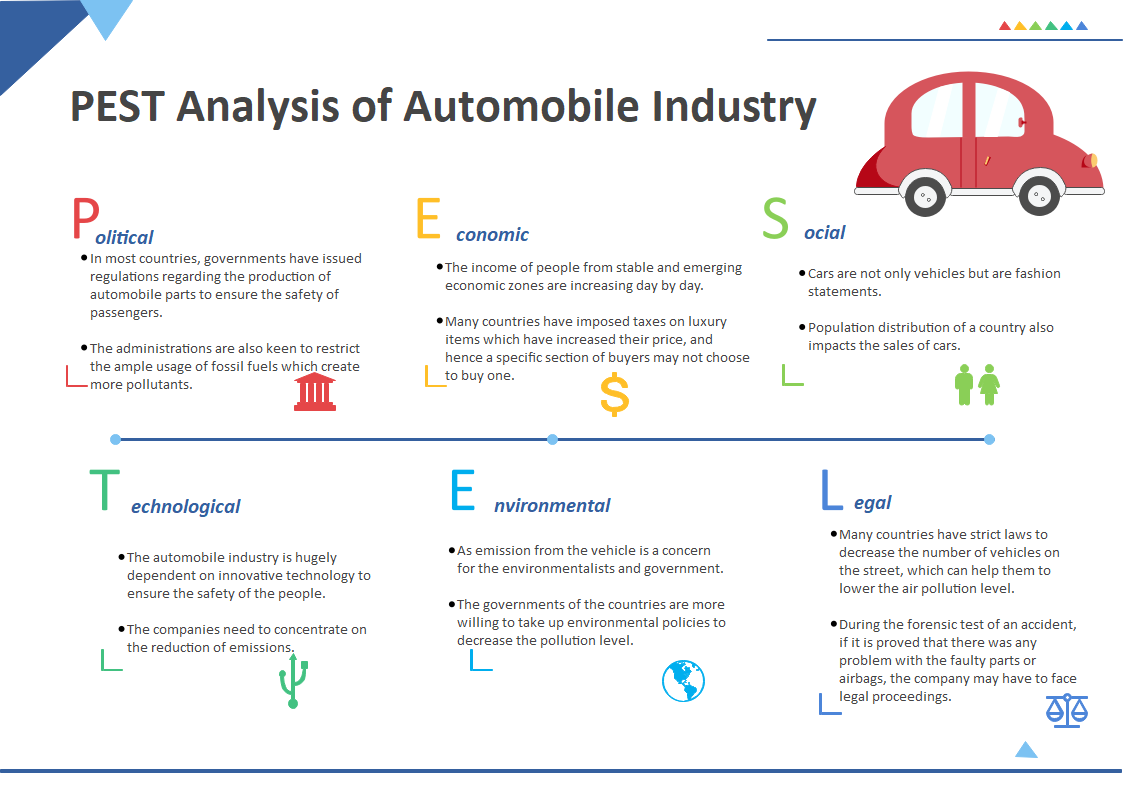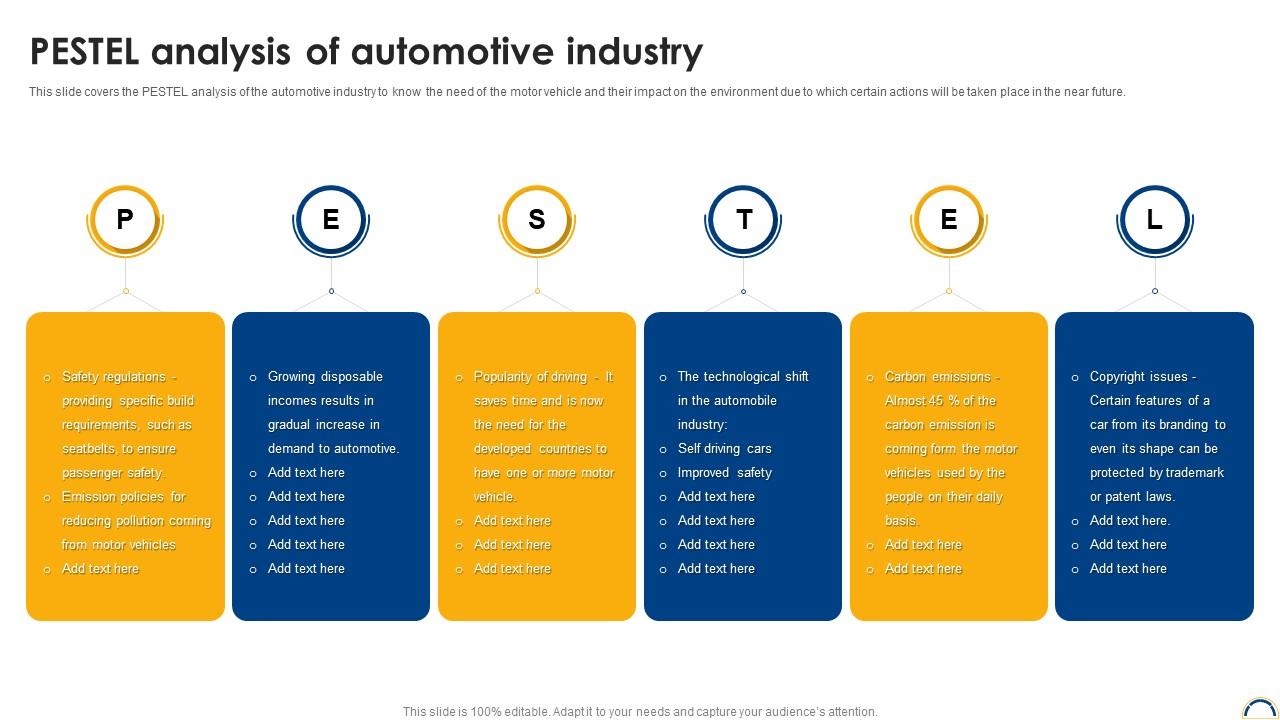In an ever-evolving automotive industry, understanding the external factors that impact a car shop’s operations is paramount for strategic planning and sustainable growth. A PESTLE analysis offers a comprehensive framework to evaluate the Political, Economic, Social, Technological, Legal, and Environmental factors influencing the automotive retail sector in the United Kingdom. By delving into these dimensions, car shops can anticipate challenges, identify opportunities, and adapt their strategies to thrive in a dynamic marketplace. This analysis aims to explore the intricacies of the UK car shop industry, providing valuable insights into the external factors shaping its landscape and influencing business decisions.
Table of Contents
TogglePolitical Factors of Car Shop Uk
Political factors affecting a car shop in the UK can include various regulations, government policies, and political stability. Some specific examples might include:
- Regulatory Environment: Car shops are subject to a wide range of regulations, including those related to safety standards, emissions controls, and consumer protection. Changes in these regulations, such as stricter emissions standards or new safety requirements, can impact the types of cars that can be sold and the costs of doing business.
- Taxation Policies: Taxation policies can affect both consumers and businesses in the automotive industry. Changes in taxes on vehicle purchases, fuel, or vehicle ownership can influence consumer demand and purchasing decisions.
- Trade Policies: Trade agreements and tariffs can impact the cost of importing vehicles and automotive parts. Changes in trade policies, such as tariffs imposed on imported vehicles or components, can affect the cost structure of a car shop and its competitiveness in the market.
- Government Subsidies and Incentives: Government subsidies or incentives for electric or low-emission vehicles can influence consumer demand and the types of vehicles that are popular in the market. Car shops may need to adapt their product offerings and marketing strategies in response to these incentives.
- Political Stability: Political stability can impact consumer confidence and economic conditions, which in turn can affect consumer spending on big-ticket items like cars. Uncertainty or instability in the political environment can lead to fluctuations in demand and economic conditions that affect the automotive industry.
- Infrastructure Investment: Government investment in transportation infrastructure, such as roads and public transportation systems, can impact the demand for cars and the viability of certain locations for car shops. Improvements in infrastructure may make it easier for consumers to access car shops, while lack of investment may hinder business operations.
- Environmental Policies: Environmental regulations aimed at reducing carbon emissions and promoting sustainability can influence the types of vehicles that are popular in the market. Car shops may need to consider factors such as the availability of electric vehicles and the demand for fuel-efficient cars in response to these policies.
Overall, political factors can have a significant impact on the operations and profitability of a car shop in the UK, and it’s essential for businesses in the automotive industry to stay informed about relevant political developments and adapt their strategies accordingly.

Economic Factors of Car Shop Uk
Several economic factors can influence car shops in the UK:
- Consumer Spending: The overall level of consumer spending in the economy affects the demand for cars. During periods of economic growth and high consumer confidence, people are more likely to spend on big-ticket items like cars. Conversely, during economic downturns, consumer spending may decrease, impacting car sales.
- Interest Rates: Interest rates set by the Bank of England influence the cost of borrowing for consumers. Lower interest rates can stimulate car sales by making financing more affordable, while higher rates may discourage borrowing and lead to decreased demand for cars.
- Unemployment Rates: The level of unemployment in the UK affects consumer confidence and purchasing power. High unemployment rates may lead to reduced demand for cars as consumers prioritize essential spending over discretionary purchases.
- Inflation: Inflation impacts both the cost of operating a car shop (such as energy costs, wages, and materials) and consumer purchasing power. High inflation may erode consumers’ disposable income, affecting their ability to buy new cars or invest in maintenance and repairs.
- Exchange Rates: Fluctuations in exchange rates can impact the cost of importing cars and car parts, which may affect the profitability of car shops. For example, a weaker pound can increase the cost of importing vehicles, potentially leading to higher prices for consumers.
- Government Policies and Regulations: Government policies related to taxation, emissions standards, and incentives for electric or low-emission vehicles can significantly impact the car industry. Changes in regulations may influence consumer preferences and the types of cars sold by car shops.
- Global Economic Conditions: The UK car industry is also influenced by global economic conditions, such as economic growth in key export markets and geopolitical events that affect trade. Changes in global demand for cars can impact the production and sales of vehicles in the UK.
- Technological Advances: Advances in automotive technology, such as electric vehicles and autonomous driving systems, can influence consumer preferences and the types of cars sold by car shops. Economic factors play a role in the adoption of these technologies and their impact on the industry.
These economic factors interact in complex ways to shape the performance of car shops in the UK, influencing aspects such as sales volume, pricing strategies, and investment decisions.

Social Factors of Car shop uk
- Demographics: The demographics of the UK population, including age, income level, occupation, education level, and family structure, can significantly impact car buying behavior. For instance, younger consumers might prefer more environmentally friendly or technologically advanced vehicles, while families might prioritize safety features and spaciousness.
- Cultural Trends: Cultural trends and societal values can influence car purchasing decisions. For example, increasing awareness and concern for environmental issues may drive demand for electric or hybrid vehicles. Similarly, cultural preferences for certain brands or types of cars can impact sales.
- Lifestyle Changes: Changes in lifestyle patterns, such as urbanization, remote work trends, and shifting preferences for mobility solutions, can affect the demand for cars. For instance, urban dwellers might prioritize smaller, fuel-efficient vehicles suitable for city driving, while rural residents might prefer larger vehicles for commuting longer distances.
- Technological Advancements: The adoption of new technologies, such as autonomous driving features, connectivity options, and advanced safety systems, can influence consumer preferences and expectations regarding car features and functionality.
- Social Media Influence: The rise of social media platforms has transformed how consumers research, discuss, and make purchasing decisions about cars. Social media influencers, online reviews, and user-generated content can significantly impact brand perception and influence buying behavior.
- Changing Mobility Patterns: Shifts in mobility patterns, including the rise of ride-sharing services, car subscription models, and alternative transportation options, can affect the traditional car ownership model and influence consumer attitudes towards purchasing new vehicles.
- Health and Safety Concerns: Public health concerns, such as the COVID-19 pandemic, can impact consumer behavior regarding car shopping. Factors like vehicle cleanliness, hygiene practices at dealerships, and preferences for contactless transactions may become more significant considerations for consumers.
- Government Policies and Regulations: Government policies, such as emission standards, congestion charges, and incentives for electric vehicles, can shape consumer preferences and influence the types of cars that are in demand.
Understanding and adapting to these social factors is essential for car shops in the UK to effectively target their customer base, tailor their offerings, and remain competitive in the market.
Technology Factors of Car Shop Uk
The technology factors that are important for a car shop in the UK can include:
- Online Presence and E-commerce: Having a robust website with an e-commerce platform for online sales of cars, parts, and accessories is crucial. Customers should be able to browse inventory, schedule service appointments, and make purchases online.
- Customer Relationship Management (CRM) Systems: Implementing CRM systems to manage customer interactions, track leads, and provide personalized services can enhance customer satisfaction and retention.
- Inventory Management Software: Utilizing inventory management software to track and manage vehicle inventory, parts, and accessories efficiently can streamline operations and improve profitability.
- Diagnostic and Repair Tools: Equipping the shop with the latest diagnostic tools and repair equipment is essential for accurately diagnosing and fixing vehicle issues.
- Point of Sale (POS) Systems: Implementing POS systems for processing transactions, managing sales, and tracking inventory can improve efficiency and accuracy in the sales process.
- Digital Marketing: Leveraging digital marketing techniques such as search engine optimization (SEO), social media marketing, and online advertising to reach potential customers and drive sales.
- Vehicle Tracking Systems: Installing vehicle tracking systems for monitoring the location and performance of vehicles in the inventory can improve security and enable efficient logistics management.
- Mobile Apps: Developing mobile apps for the car shop that allow customers to schedule service appointments, receive notifications, and access exclusive offers can enhance the overall customer experience.
- Data Analytics: Utilizing data analytics tools to analyze customer preferences, market trends, and sales data can provide valuable insights for strategic decision-making and business growth.
- Cybersecurity Measures: Implementing robust cybersecurity measures to protect customer data, financial transactions, and sensitive business information from cyber threats and data breaches.
By integrating these technology factors into their operations, car shops in the UK can improve efficiency, enhance customer experience, and stay competitive in the rapidly evolving automotive industry.

Legal Factors of Car Shop uk
Operating a car shop in the UK involves compliance with various legal factors, including:
- Business Registration and Licensing: Registering your car shop as a legal entity, such as a sole proprietorship, partnership, or limited company, and obtaining any necessary licenses or permits to operate the business legally.
- Consumer Rights and Protection: Ensuring compliance with consumer protection laws, such as providing clear pricing, offering refunds or exchanges, and adhering to regulations regarding warranties and guarantees.
- Data Protection: Adhering to the General Data Protection Regulation (GDPR) when handling customer data, including obtaining consent for data collection, ensuring data security, and providing individuals with access to their personal information.
- Product Liability: Ensuring that the vehicles and parts sold meet safety standards and regulations, and being prepared to address any liability claims that may arise from defective products.
- Environmental Regulations: Compliance with environmental regulations, such as proper disposal of hazardous materials like oil and batteries, and adhering to emissions standards for vehicles.
- Employment Law: Compliance with employment laws regarding hiring, wages, working conditions, and health and safety regulations for employees.
- Advertising Standards: Ensuring that advertising and marketing materials comply with relevant laws and standards, including accuracy in pricing and product descriptions.
- Financial Regulations: Compliance with financial regulations, such as accounting standards, tax laws, and any regulations governing loans or financing options offered to customers.
- Intellectual Property: Respecting intellectual property rights, such as trademarks and copyrights, when using logos, brand names, or other protected materials.
- Competition Law: Avoiding anti-competitive practices, such as price-fixing or collusion with competitors, and adhering to regulations regarding fair competition in the market.
- Health and Safety: Ensuring a safe working environment for employees and customers, including compliance with regulations regarding fire safety, electrical safety, and workplace hazards.
- Vehicle Regulations: Adhering to regulations regarding vehicle sales, including registration procedures, vehicle identification number (VIN) requirements, and documentation for vehicle transfers.
It’s important for car shop owners in the UK to stay informed about relevant laws and regulations and to seek legal advice when necessary to ensure compliance and avoid legal issues.
Environmental Factors of Car Shop Uk
Environmental factors affecting car shops in the UK can vary and may include:
- Government Regulations: The UK government has stringent regulations regarding emissions, waste disposal, and energy consumption. Car shops need to comply with these regulations to avoid fines and maintain their operations.
- Carbon Emissions and Climate Change: There is growing concern about carbon emissions from vehicles and their contribution to climate change. Car shops may face pressure to offer more eco-friendly options and adopt sustainable practices.
- Fuel Prices: Fluctuations in fuel prices can affect consumer behavior and demand for certain types of vehicles. High fuel prices may lead to increased interest in fuel-efficient cars or alternative fuel vehicles.
- Public Transport Infrastructure: The availability and efficiency of public transportation can impact the demand for personal vehicles. In areas with well-developed public transport systems, there may be less demand for cars, whereas in areas with poor public transport, car ownership may be higher.
- Urbanization: The trend of urbanization can influence the location and size of car shops. As more people move to cities, there may be a greater demand for smaller, more fuel-efficient vehicles suited to urban environments.
- Technological Advancements: Advances in technology, such as electric vehicles (EVs), autonomous vehicles, and car-sharing services, can disrupt the traditional car sales model. Car shops need to stay updated with these advancements to remain competitive.
- Consumer Preferences and Awareness: Increasing awareness of environmental issues may influence consumer preferences for eco-friendly vehicles and sustainable practices. Car shops may need to adjust their offerings and marketing strategies accordingly.
- Waste Management and Recycling: Car shops generate various types of waste, including used parts, fluids, and packaging materials. Proper waste management and recycling practices are essential to minimize environmental impact and comply with regulations.
- Supply Chain Sustainability: Car shops rely on a complex supply chain that includes manufacturers, distributors, and suppliers. Ensuring the sustainability and ethical practices of suppliers can help car shops reduce their environmental footprint and enhance their reputation.
- Renewable Energy Adoption: Car shops can reduce their environmental impact by adopting renewable energy sources such as solar or wind power for their operations. This can help reduce carbon emissions and lower energy costs in the long term.
Understanding and addressing these environmental factors is crucial for car shops in the UK to remain competitive, comply with regulations, and contribute to sustainability efforts.






